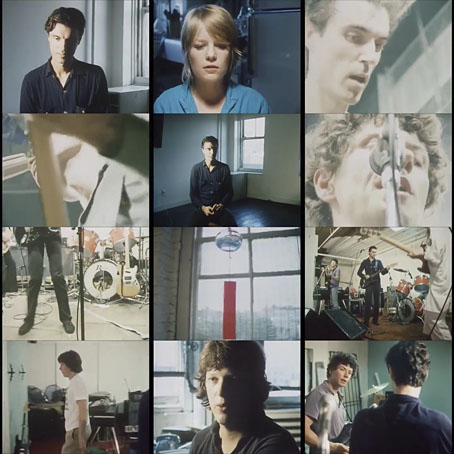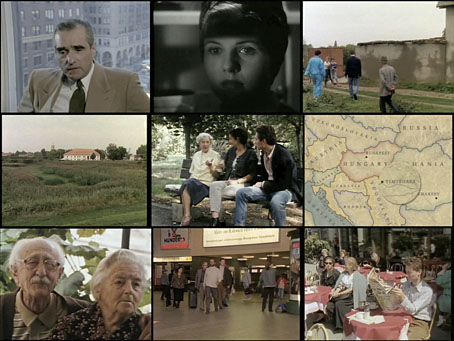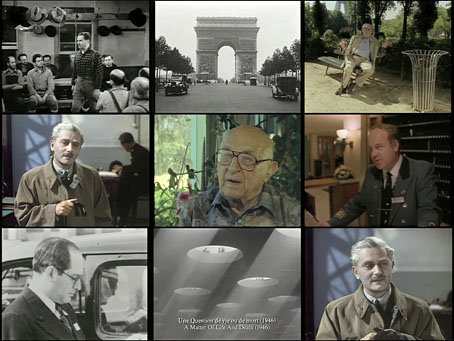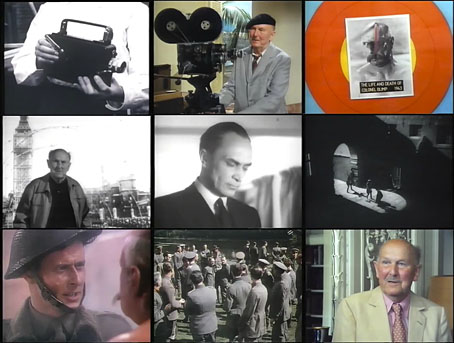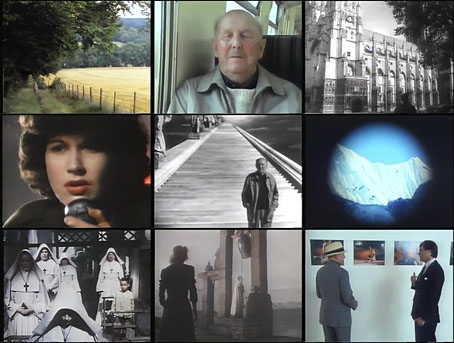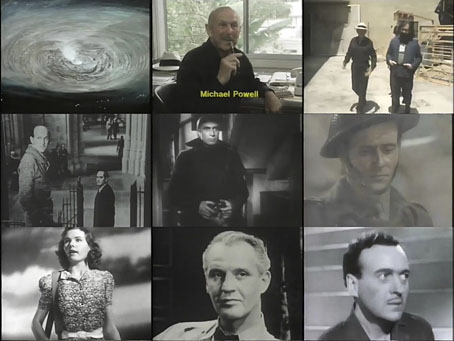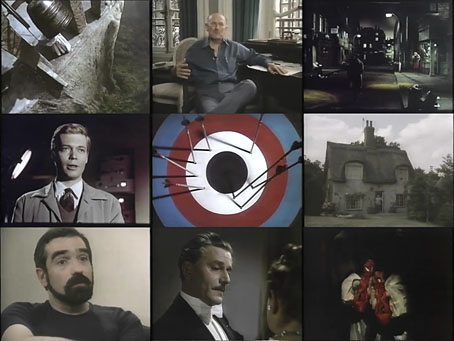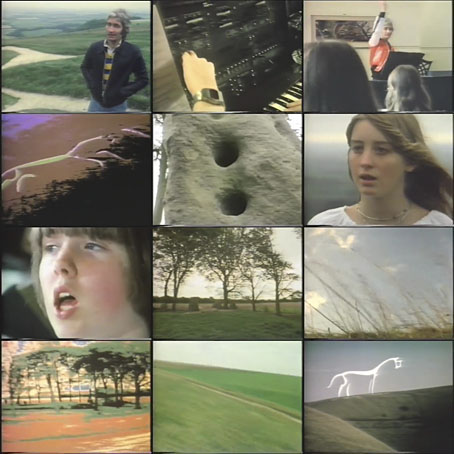Like many UK arts documentaries, The South Bank Show seldom repeated its films so you had to watch them when they were broadcast or you might never see them at all. This Talking Heads feature from 1979 is one that I missed, a great portrait of the band shortly after the release of their third album, Fear Of Music. Shots of the group performing songs from the first three albums are intercut with interviews and montages of American TV. You also get to see a very young-looking David Byrne writing (or attempting to write) some lyrics. The most revelatory aspect of the film now is the discussion of the ordinariness of both the band and their lyrics. In 1979 being resolutely mundane had become a radical position.
Category: {television}
Television
The Making of an Englishman: Emeric Pressburger
After Powell & Pressburger together, then Powell solo, here’s a biographical portrait of Emeric Pressburger by his grandson, Kevin MacDonald. Pressburger wrote the scripts of the films made under The Archers name, and Powell was the director, of course, but the pair always insisted on a shared credit for writing, production and direction. The Archers films were true “Third Mind” creations which is why (Peeping Tom aside) Powell or Pressburger working alone often seemed diminished.
The Making of an Englishman (1995) was Kevin MacDonald’s first documentary which he’s since followed with others including the excellent Donald Cammell: The Ultimate Performance (1998) and Touching the Void (2003), and feature films such as The Last King of Scotland (2006) and The Eagle (2011). His film about Emeric Pressburger was a welcome counterweight to the attention given to Michael Powell in The Archers partnership. Pressburger was Jewish, and emigrated to Britain from Hungary to escape the Nazis. This experience famously informs the script of The Life and Death of Colonel Blimp (1943), and it was Pressburger’s Continental character and an outsider’s eye that helps set the films of The Archers apart from those being made in Britain during the 1940s.
Previously on { feuilleton }
• The South Bank Show: Michael Powell
• Powell & Pressburger: A Pretty British Affair
• The Rite of Spring and The Red Shoes
• Michael Powell’s Bluebeard revisited
• The Tale of Giulietta
The South Bank Show: Michael Powell
This is the other great TV documentary about The Archers, the focus being on Michael Powell alone this time. The first volume of Powell’s autobiography, A Life in Movies, was published in 1986 which prompted this episode of The South Bank Show. Powell got to direct this one so there are many playful visual moments while tracing a career from a chance meeting with a Hollywood film crew in the south of France to the heights of the British film industry (and, in Black Narcissus, the painted peaks of the Himalayas). If you like Powell’s films his autobiography is essential reading. For a guide to the films of The Archers I’d recommend Arrows of Desire: The Films of Michael Powell and Emeric Pressburger by Ian Christie.
Previously on { feuilleton }
• Powell & Pressburger: A Pretty British Affair
• The Rite of Spring and The Red Shoes
• Michael Powell’s Bluebeard revisited
• The Tale of Giulietta
Powell & Pressburger: A Pretty British Affair
“It’s the only thing that fulfils its promise…magic,” says Martin Scorsese, referring to a shot of an arrow thudding into its target at the beginning of a feature film. A pierced target accompanied by the words “A Production of The Archers” heralded the films made by Michael Powell and Emeric Pressburger from 1943 to 1957, films that included The Life and Death of Colonel Blimp (1943), A Canterbury Tale (1944), I Know Where I’m Going! (1945), A Matter of Life and Death (1946), Black Narcissus (1947), The Red Shoes (1948), Gone to Earth (1950) and The Tales of Hoffmann (1951). A Very British Affair (1981) is a 50-minute documentary made for the BBC’s Arena strand by Charles Cabot and Gavin Millar that charts the progress of Powell and Pressburger’s partnership. There’s also some discussion of Powell’s Peeping Tom (1960), the film that sank his career in Britain but which is now regarded as a masterpiece of self-reflexive cinema.
This is the best documentary about The Archers, not only for the interviews with the two men but also for the extraneous business with Michael Powell in Los Angeles and New York. In both cities the director is seen with two younger filmmakers who helped resurrect his reputation in the 1980s: Francis Coppola (seen wandering around the sets used in One from the Heart) and Martin Scorsese. The latter is interviewed during the filming of The King of Comedy, and we get to see a brief between-takes moment with Jerry Lewis and Robert De Niro. Powell was a kind of backroom advisor to Scorsese at this time, offering suggestions during the production of Raging Bull and After Hours. On the west coast he was working on projects that would have been films for Coppola’s American Zoetrope but—as we now know—nothing materialised.
Previously on { feuilleton }
• The Rite of Spring and The Red Shoes
• Michael Powell’s Bluebeard revisited
• The Tale of Giulietta
The Song of the White Horse by David Bedford
Many of the old TV documentaries I link to are ones I saw when first broadcast and wanted to see again, but this edition of the BBC’s Omnibus from 1978 is one I missed. The late David Bedford is a familiar name in British music: in the 1970s he was as much known for his orchestral arrangements for Kevin Ayers, Roy Harper, Mike Oldfield, et al as for his own album-length compositions. The Omnibus film concentrates on the composition and performance of a new Bedford piece inspired by the ancient earthwork known as the White Horse of Uffington.
The first half of the film has Bedford visiting the White Horse and nearby Wayland’s Smithy before returning to his studio where he shows the film crew some of his electronic gear. Later we get to see Mike Ratledge of Soft Machine helping create an electronic equivalent of the sound made by the Blowing Stone. The second half of the film has a complete performance of Bedford’s piece which takes its libretto from The Ballad of the White Horse by GK Chesterton. The sound quality doesn’t do the composition any favours at all but Bedford did record the piece in 1983 for Mike Oldfield’s label.
Previously on { feuilleton }
• Hill figures

